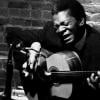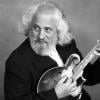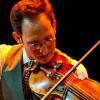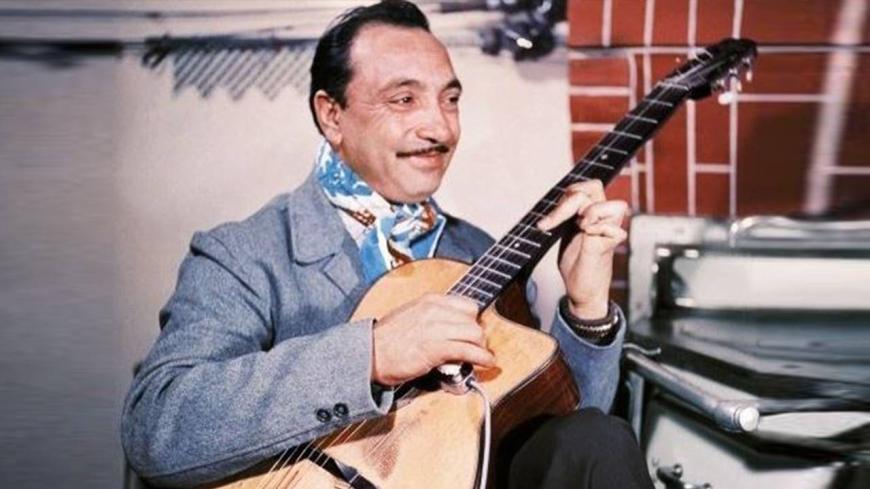
In the days before Django Reinhardt was struck down by a cerebral hemorrhage on May 16, 1953, the 43-year-old Belgian-born Manouche jazz guitarist felt overlooked and discarded. It’s true that the jazz style he created in the mid-1930s with French violinist Stéphane Grappelli in the Quintette du Hot Club de France, Europe’s first innovative contribution to the American art form, had fallen out of favor, a victim of changing musical fashion and the ahistorical consciousness of the Roma people, who were known — often disparagingly — as Gypsies.
According to Roma custom, three days after Reinhardt’s death in Samois-sur-Seine his wife Naguine piled up his clothes, treasured Selmer guitar and sundry other possessions, struck a match, and sent his worldly goods up in flames. His younger brother, Joseph “Nin-Nin” Reinhardt, who had perfected the essential Hot Club pulse accompanying Django in the Hot Club, abandoned his guitar and banished Django’s name from his lips, a protocol of Manouche mourning. But Django’s bleak outlook on his legacy turned out to be wildly off the mark.
As his 112th birthday approaches on January 23, Reinhardt has never been more relevant. It’s not just that there are dozens of Hot Club-style combos around the world playing his compositions or expanding on the string band sound he and Grappelli created. His influence extends far beyond jazz, touching guitarists in acoustic and electric idioms from bluegrass and rock to country and pop. Heard on film soundtracks and commercials, the ebullient Hot Club bounce is an unavoidable part of the world’s soundscape. It’s entirely fitting that the venue that has hosted an annual birthday celebration is Berkeley’s Freight & Salvage, the erstwhile folk venue with an international stylistic purview. Sadly, the three-day celebration Jan. 21–23 has fallen victim to Omicron. DjangoFest Mill Valley is also coming up next month, but only a few acts are listed so far, including the violin and guitar duo of Tim Kliphuis and Jimmy Grant at Throckmorton Theatre Feb. 4–5.
The Freight celebration was slated to kick off with a triple bill headlined by French guitarist Stephane Wrembel, a brilliant improviser and composer who’s been a leading force in expanding the possibilities of Gypsy jazz for the past two decades. Wrembel isn’t Manouche, but he grew up in the Gypsy jazz hotbed of Fontainebleau, and after a teenage period absorbing the music of Pink Floyd, Led Zeppelin, and Peter Gabriel-era Genesis, he fell under Reinhardt’s sway.
“That sound was around somehow, not very loud, but you’d go for a drink and Babik Reinhardt was around,” said Wrembel, referring to Django’s son, an accomplished Manouche jazz guitarist who was just as interested exploring jazz/rock fusion settings. The Stephane Wrembel Band is still scheduled to perform Jan. 24 at Kuumbwa Jazz Center. Wrembel also plays Dizzy's Jazz in San Diego on Jan. 18, SOhO Restaurant & Music Club in Santa Barbara Jan. 19, and Theatre Raymond Kabbaz in Los Angeles Jan. 20.
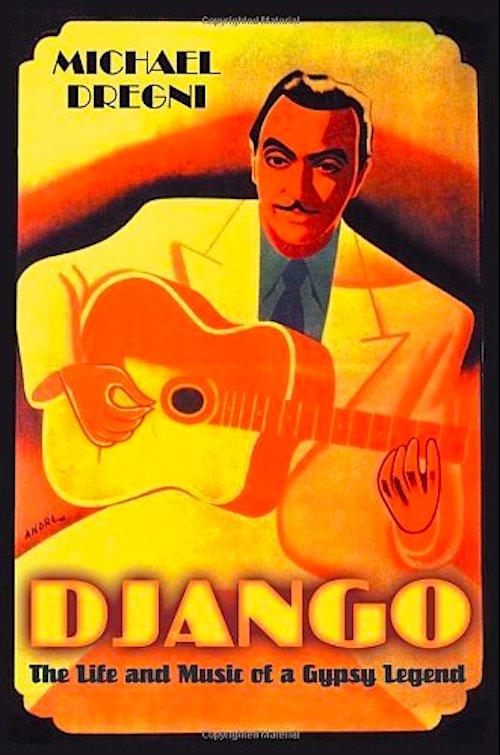
After deciding pursue music professionally at 19, Wrembel started exploring Gypsy jazz when his teacher introduced him to Reinhardt’s standard “Minor Swing.” He bought his first Reinhardt album “and saw the Gypsies play at the annual Festival Django Reinhardt in Fontainebleau and something clicked in my mind,” he said. “I dedicated my whole life to trying to break that code. The goal is not to be Django. That’s impossible. But he created a sound and approach within which the whole modern world is contained.”
As far as his influence has spread, Reinhardt’s impact is deepest within the far-flung Roma world, where he’s revered amongst Central and Western European Roma people to this day. His photo can often be found in Romani houses, “a cultural hero for a people with few heroes,” according to Michael Dregni’s authoritative 2004 biography, Django: The Life and Music of a Gypsy Legend.
In the United States, a confluence of technology, affordable Selmer/Maccaferri–style guitars, and Reinhardt’s recurrent presence in popular culture has helped feed a movement that shows few signs of cresting. In the 1990s, Hot Club-style bands were often seen as novelty acts, more likely to be welcomed at trad jazz festivals than leading jazz venues. The Hot Club scene now sustains its own economy, with competing guitar lines, instructional DVDs, and a Djangocentric festival circuit.
No one has done more to champion Reinhardt’s music in the Bay Area than guitarist Paul “Pazzo” Mehling, who founded the Hot Club of San Francisco (HCSF) long before the Gypsy jazz renaissance. He’s worked closely with Peter Williams in programming the Reinhardt birthday celebration since the Freight’s artistic director launched the festival in 2019, and has always cast a wide net. This year’s roster included Los Angeles-based Trio Dinicu and fiddler Elana James’s Western swing meets Django combo Hot Club of Cowtown, “which has the same violin, guitar, and bass instrumentation as Trio Dinicu but a completely different sound,” Mehling said. Celebrating its 25th year, Hot Club of Cowtown plays Harlow’s in Sacramento on Jan. 28 and Sweetwater Music Hall on Jan. 29.
“Peter’s idea is there should always be one real outlier, one real odd ball every year. Biréli Lagrène was here two years ago and he didn’t play any Django at all even though he’s the heir apparent,” Mehling continued, referring to the masterly Manouche guitarist who toured with Al Di Meola, Paco de Lucía, and John McLaughlin. “Django used to be an acquired taste and now it’s so ubiquitous. That’s my life’s work.”
When Mehling first started delving into Reinhardt’s music the transcriptions circulated like samizdat, passed hand to hand from one player to another. He caught the Django bug as a young Bay Area musician in the 1970s, and managed to glean information from Raul Reynoso and John Jorgenson down in Southern California. But when it came to finding a working Hot Club style combo, “from what I remember, there was nobody,” Mehling said. “Mike Marshall and Darol Anger were getting in that orbit with Dave Grisman, but they were doing something original, which is the hipper thing to do.”
He spent much of the 1980s as rhythm guitarist for Dan Hicks and the Hot Licks, a band drew on Manouche jazz as one of many influences. When he launched the Hot Club of San Francisco in 1989, finding a rhythm guitarist capable of supplying the signature Gypsy jazz syncopation, known as le pompe, proved impossible. Over the years, the HCSF has recorded a string of albums that artfully elaborate on the synergy created by Django, Nin-Nin and Grappelli by attracting a steady flow of top Bay Area talent, including guitarists Adam Levy, Josh Workman and Gaucho Jazz’s Dave Ricketts, bassist Joe Kyle, and violinists Julian Smedley, Jenny Scheinman, and Turtle Island Quartet’s Evan Price (who’s held down the HCSF’s fiddle chair for many years).
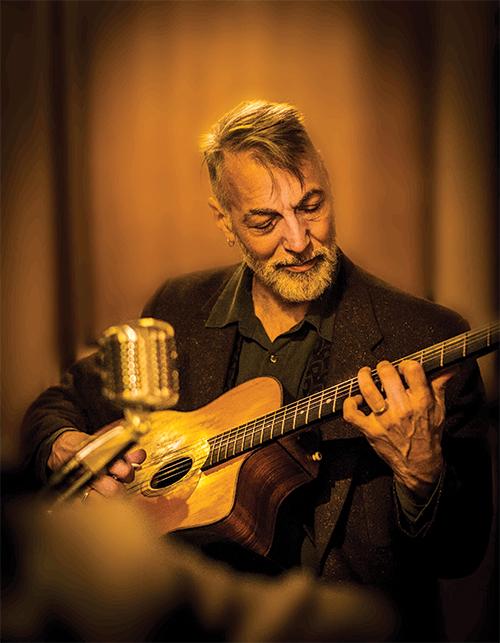
The HCSF paved the way for a myriad of Hot Club-inspired bands in the Bay Area, including Gaucho, Barrio Manouche, Mission Hot Club, and Gypsy Tribe. The power of Reinhardt’s legacy is such that musicians not associated with the Hot Club scene contend with it. Mimi Fox is one of jazz’s most respected mainstream guitarists, and as a passionate devotee of her instrument, she’s explored Reinhardt’s music “because it’s foundational and all grist for the mill as a composer. Along with Charlie Christian, he was a master and pioneer. And my paternal grandfather was a Hungarian Gypsy, so I have that personal connection.”
Untangling notions of cultural ownership inevitably leads to some sticky brambles. Reinhardt himself was originally perceived as an inauthentic jazzman, which makes sense in the context of early 1930s Paris. African-American music arrived in France with U.S. doughboys during World War I, and the Jazz Age arrived in 1925 courtesy of the callipygous Josephine Baker, whose divine derriere turned on the City of Lights. France’s love affair with jazz was based partly on a racialized conception of the music, and in its first year or two Reinhardt and Grappelli’s Hot Club was dismissed because “a band made up of Gypsy guitarists and Frenchmen was not the real thing,” according to Dregni’s Reinhardt biography.
The real thing was supplied in many cases by African-American musicians drawn to Paris as a haven from America’s rampant racism. For Reinhardt, however, Paris offered no respite from the centuries-old prejudice that locked Gypsies out of mainstream French society (prejudice that remains rife across Europe, leading to widespread segregation and discrimination). Just as Reinhardt is beyond worldly cares, the musical movement he co-founded has put down roots around the world, offering avenues for passionate self-expression traveled by Roma and gadjo alike.


